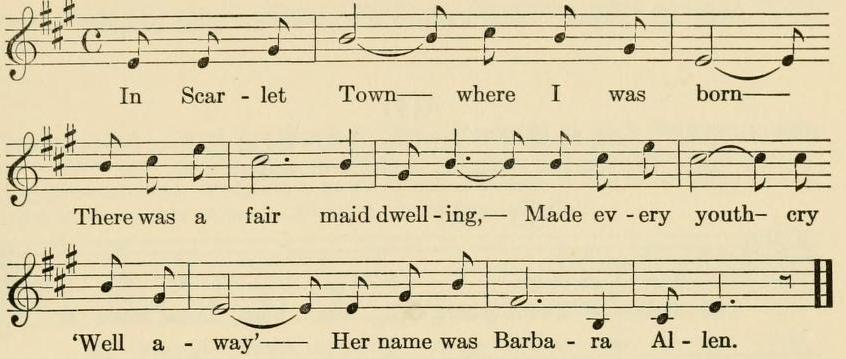Barbara Allen- Pittman Bros. (NC) 1939 Brown 4A3
[Partial text given with music. From the Brown Collection; Volume 4, 1957. The Brown editors' notes follow.
R. Matteson 2015]
27. Bonny Barbara Allan (Child 84)
Of all the ballads in the Child collection this is easily the most widely known and sung, both in the old country and in America. Scarcely a single regional gathering of ballads but has it, and it has been published in unnumbered popular songbooks. See BSM 60-1. Mrs. Eckstorm in a letter written in 1940 informed me that she and Barry had satisfied themselves, before Barry's death, that as sung by Mrs. Knipp to the delight of Samuel Pepys in 1666 it was not a stage song at all but a libel on Barbara Villiers and her relations with Charles II; but so far as I know the details of their argument have never been published. The numerous texts in the North Carolina collection may conveniently be grouped according to the setting in three divisions: (1) those that begin in the first person of Barbara's lover (or at least of the narrator), (2) those that begin with a springtime setting, and (3) those that begin with an autumnal setting. Of course those in group 1 may also have either the springtime or the autumnal setting. The rose-and-brier ending is likely to be attached to any of the texts. The lover's bequests to Barbara, a feature not infrequent in modern British versions but unusual in America, appears once in the North Carolina texts, in F. The first person of the lover commonly is dropped after the opening stanza, but in F it holds through four stanzas. Not all of the texts are given in full.
A(3) 'Barbara Allen.' Sung by the Pittman brothers. Recorded at Handy, Davidson county, August 21, 1939. The last six measures are quite closely related to those of the Eggers 27A(1) and Anon 27S.

For melodic relationship cf. **SharpK i 192 and I95, No. 24K, measures 3-6 and version O, measures 2-4, basic melodic relationship only; MSHF 6, beginning and ending. Scale: Mode III, plagal. Tonal Center: e. Structure: abbk (2,2,2,2) = ab (4,4).